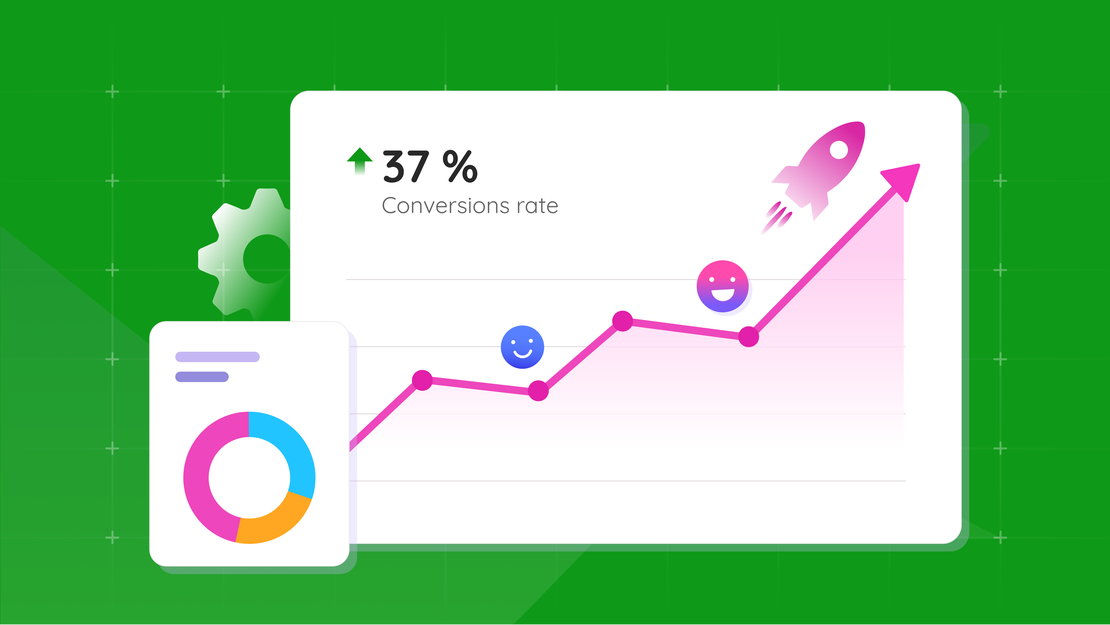How to Boost Your Conversion Rate With CRM

Table Of Contents
What is a CRM system?
A CRM (Customer Relationship Management) system is a tool that allows you to track all your customer data and interactions in one place. This helps you understand exactly who your customers are, what they need, and when it’s best to contact them.
While you can create a CRM system in a simple Excel sheet, most modern businesses use a CRM tool, such as FlowQi CRM. This tool is designed specifically for small to medium-sized businesses, including freelancers.
Want to try it out for free? Sign up for our BETA Program to try out FlowQi CRM and all our other tools.
How a CRM system helps boost your conversion rate
1. A CRM system gives you better insight into customer behavior
A CRM system tracks all customer interactions, such as:
- Pages visited on your website
- Opened emails and click behavior
- Purchase history
- Contact moments (emails, phone calls, chats)
- Completed forms or downloads
With this information, you can see which products or services are most interesting to a particular target audience. You can then send that target group special offers or campaigns aimed at those products/services. In doing so, you increase your chances of conversion.
2. A CRM system can automatically apply lead scoring
A CRM system can automatically apply lead scoring, where leads are given a score based on their behavior. This score can be determined in various ways, such as based on actions like clicking on links, filling out forms, or requesting a demo.
This helps increase your conversion rate in several ways:
- Lead scoring allows you to identify the most promising leads. By focusing on those with the highest scores, you can direct your efforts toward the leads most likely to convert.
- Warm leads – those with the highest score – can be followed up more quickly, for example, with a personal conversation or a targeted offer. Since these leads have already shown interest, they are more likely to make a purchase decision faster.
- Cold leads – those with a lower score – can still become valuable customers, but they may take longer to convert. Instead of approaching them immediately with a sales offer, continue to nurture them with valuable content like blogs, e-books, or newsletters.
3. A CRM system strengthens relationships with your customers and leads
The days of sending generic emails to your entire email list are over. More than 80% of consumers say personalization influences their buying behavior. Personalization is crucial for boosting your conversion rate.
But how can you personalize your approach without burning yourself out or becoming best friends with every lead?
With a CRM system, you can make your marketing much more personal because you know exactly who your customers are and what they need. A CRM tool allows you to:
- Automatically send targeted emails based on behavior. For example, send a special offer when someone frequently visits a specific page.
- Automatically send a follow-up when someone downloads a free e-book or abandons a shopping cart.
- Automatically create lists of customers based on interests, purchase history, or interactions. For example, send specific content to webshop owners and different content to bloggers.
- Automatically send personalized offers. Offer your subscribers a discount on their birthday or give loyal customers an exclusive discount or gift.
4. A CRM system helps improve your sales strategy
With a CRM tool, you can see exactly how many leads are at each stage of your sales process. It gives you valuable insight into your sales funnel, allowing you to analyze where most leads drop off.
For example, are you noticing leads dropping out after receiving an offer? This could indicate that your offer or pricing doesn’t align with their needs. Alternatively, if customers show interest but don’t make a purchase, it might be due to poor follow-up or a complicated buying process.
Ask your abandoning leads why they don’t follow through. You can do this manually (via email or a survey) or by installing a tool on your website that asks people what’s holding them back. Here are a few ideas:
- A pop-up form with: “Are you missing any information? Let us know.”
- A chat window that automatically sends a message if someone stays on a page for too long.
- A widget or button that allows visitors to indicate, with one click, why they are unsure. For example, “What else are you missing to contact us?” (with choices or an open field).
- A/B testing. If visitors aren’t clicking through on your contact page, test whether a different text works better. For example, “Schedule a free consultation” might sound more inviting than “Contact us.”
5. A CRM system makes upselling a lot easier
Because a CRM system tracks the products or services a customer has purchased, it makes upselling much easier. Here are a few examples:
- Offer relevant complementary products or upgrades.
- Capitalize on patterns in repeat purchases. For example, if a customer bought a basic subscription, you can suggest an upgrade to a premium plan after a certain period.
- Send an offer for a more expensive alternative if someone frequently buys a particular product.
- Offer an additional service or warranty immediately after a purchase.
- Remind customers of a complementary product, such as a case for a phone or an SEO audit after they’ve completed an SEO course.
Try FlowQi CRM + all our other business software for free
Sign up now for our BETA program and get exclusive access to our CRM tool and all our other tools—completely free.